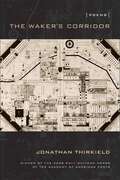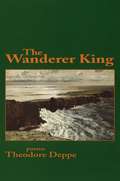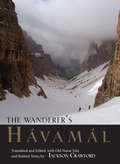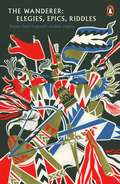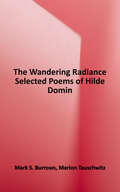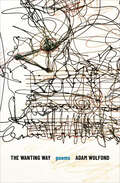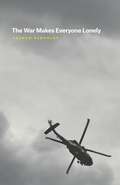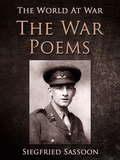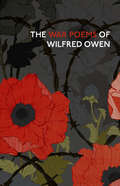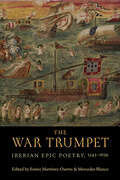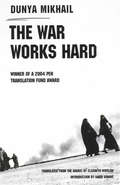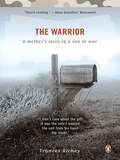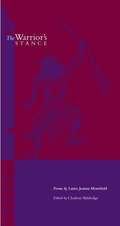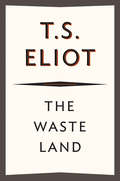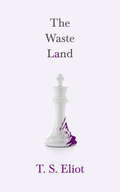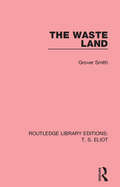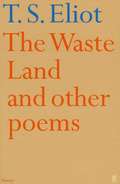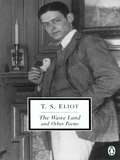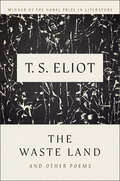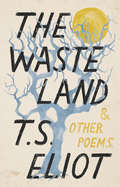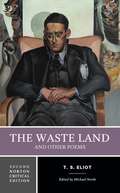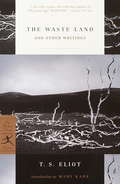- Table View
- List View
The Waker's Corridor: Poems (Walt Whitman Award of the Academy of American Poets)
by Jonathan Thirkield"I had a clock it woke all day," writes Jonathan Thirkield at the outset of The Waker's Corridor, a book that charts an assiduous attempt to recover lost time. Housed in elaborate and varied formal architectures, these poems navigate the disorder and gaps left by the violence of loss. All measures of time -- psychological, personal, historical, numerical -- collide and overlap in intensely lyrical verse. What results is a journey that winds through shifting lands and interiors, across theatrical stages and city streets, into voices and objects that emerge in sudden, vivid relief, and just as quickly disappear. By turns dreamlike and sternly rational, arcane and contemporary, intimate and dramatic, it is a book of blinding, austere, and beautiful awakenings.
The Wanderer King
by Theodore Deppe"In these elegant and searing poems, Theodore Deppe gives voice to the full complexity of human character, creating a world that is charged and expansive. With cinematic vividness and stunning eloquence, these poems examine the tensions between hope and despair, responsibility and mystery - as if a sacred universe we were in danger of losing had been stayed at the moment of vanishing. The dramatic monologues are a triumph of the imagination." --Betsy Sholl
The Wanderer's Havamal
by Jackson CrawfordThe Wanderer&’s Hávamál features Jackson Crawford&’s complete, carefully revised English translation of the Old Norse poem Hávamál, newly annotated for this volume, together with the original Old Norse text sourced directly from the Codex Regius manuscript. Crawford&’s classic Cowboy Hávamál, and translations of other related texts central to understanding the character, wisdom, and mysteries of Óðinn (Odin), round out the volume. Portable and reader-friendly, it makes an ideal companion for both lovers of Old Norse mythology and those new to the wisdom of this central Eddic poem wherever they may find themselves.
The Wanderer: Elegies, Epics, Riddles (Legends from the Ancient North)
by Petra BornerPart of a new series Legends from the Ancient North, The Wanderer tells the classic tales that influenced JRR Tolkien's The Hobbit and The Lord of the Rings'So the company of men led a careless life,All was well with them: until One beganTo encompass evil, an enemy from hell.Grendel they called this cruel spirit...'J.R.R. Tolkien spent much of his life studying, translating and teaching the great epic stories of northern Europe, filled with heroes, dragons, trolls, dwarves and magic. He was hugely influential for his advocacy of Beowulf as a great work of literature and, even if he had never written The Hobbit and The Lord of the Rings, would be recognised today as a significant figure in the rediscovery of these extraordinary tales.Legends from the Ancient North brings together from Penguin Classics five of the key works behind Tolkien's fiction.They are startling, brutal, strange pieces of writing, with an elemental power brilliantly preserved in these translations.They plunge the reader into a world of treachery, quests, chivalry, trials of strength.They are the most ancient narratives that exist from northern Europe and bring us as near as we will ever get to the origins of the magical landscape of Middle-earth (Midgard) which Tolkien remade in the 20th century.
The Wandering Radiance: Selected Poems of Hilde Domin
by Hilde DominHilde Domin was one of the most highly regarded German poets of the 20th century. Her work was deeply influenced by her time in exile and the loss of homeland. A poet of the Jewish faith, she fled political developments in Germany in 1932 and spent more than twenty years of her life in various countries including the Dominican Republic, which became her self-chosen namesake. After returning home to Germany from exile she became known as the "poet of return" and received numerous honors for her literary work, including the Carl Zuckmayer Medal, the Nelly Sachs Prize, and the Grand Federal Cross of Merit. The Wandering Radiance is a selection of poems that spans decades. Presented bilingually, many of these poems appear here for the first time in English, brilliantly translated by Mark S. Burrows.
The Wanting Way: Poems
by Adam WolfondIn The Wanting Way, the second book in Multiverse—a literary series written and curated by the neurodivergent—Adam Wolfondproves more than willing to “extend the choreography.”In fact, his entire thrust is out and toward. Each poem moves out along its own underutilized pathway, awakening unseen dimensions for the reader like a wooded night walk suddenly lit by fireflies. And as each path elaborates itself, Wolfond’s guiding hand seems always to stay held out to the reader, inviting them further into a shared and unprecedented unfolding. The Wanting Way is actually a confluence of diverse ways—rallies, paths, waves, jams, streams, desire lines—that converge wherever the dry verbiage of the talking world requires hydration. Each poem is an invitation to bathe in the play of languaging. And each poem is an invitation to a dance that’s already happening, called into motion by the objects and atmospheres of a more-than-human world. Wolfond makes space for new poetics, new choreographies, and new possibilities toward forging a consensual—felt and feeling—world where we might find free disassembly and assembly together. There is a neurodivergent universe within this one, and Wolfond’s poems continuously pull back the unnecessary veil between human and nature.
The War Makes Everyone Lonely (Phoenix Poets)
by Graham BarnhartIn his first collection of poems, many of which were written during his years as a US Army Special Forces medic, Graham Barnhart explores themes of memory, trauma, and isolation. Ranging from conventional lyrics and narrative verse to prose poems and expressionist forms, the poems here display a strange, quiet power as Barnhart engages in the pursuit and recognition of wonder, even while concerned with whether it is right to do so in the fraught space of the war zone. We follow the speaker as he treads the line between duty and the horrors of war, honor and compassion for the victims of violence, and the struggle to return to the daily life of family and society after years of trauma. Evoking the landscapes and surroundings of war, as well as its effects on both US military service members and civilians in war-stricken countries, The War Makes Everyone Lonely is a challenging, nuanced look at the ways American violence is exported, enacted, and obscured by a writer poised to take his place in the long tradition of warrior-poets.
The War Makes Everyone Lonely (Phoenix Poets)
by Graham BarnhartIn his first collection of poems, many of which were written during his years as a US Army Special Forces medic, Graham Barnhart explores themes of memory, trauma, and isolation. Ranging from conventional lyrics and narrative verse to prose poems and expressionist forms, the poems here display a strange, quiet power as Barnhart engages in the pursuit and recognition of wonder, even while concerned with whether it is right to do so in the fraught space of the war zone. We follow the speaker as he treads the line between duty and the horrors of war, honor and compassion for the victims of violence, and the struggle to return to the daily life of family and society after years of trauma. Evoking the landscapes and surroundings of war, as well as its effects on both US military service members and civilians in war-stricken countries, The War Makes Everyone Lonely is a challenging, nuanced look at the ways American violence is exported, enacted, and obscured by a writer poised to take his place in the long tradition of warrior-poets.
The War Poems (The World At War)
by Siegfried SassoonSiegfried Loraine Sassoon, CBE, MC (8 September 1886 – 1 September 1967) was an English poet, writer, and soldier. Decorated for bravery on the Western Front, he became one of the leading poets of the First World War. His poetry both described the horrors of the trenches, and satirised the patriotic pretensions of those who, in Sassoon's view, were responsible for a jingoism-fuelled war. Sassoon became a focal point for dissent within the armed forces when he made a lone protest against the continuation of the war in his "Soldier's Declaration" of 1917, culminating in his admission to a military psychiatric hospital. (Excerpt from Wikipedia)
The War Poems Of Wilfred Owen
by Wilfred Owen'Orpheus, the pagan saint of poets, went through hell and came back singing. In twentieth-century mythology, the singer wears a steel helmet and makes his descent "down some profound dull tunnel" in the stinking mud of the Western Front. For most readers of English poetry, the face under that helmet is that of Wilfred Owen.' Professor Jon Stallworthy, from his Introduction.When Wilfred Owen was killed in the days before the Armistice in 1918, he left behind a shattering, truthful and indelible record of a soldier's experience of the First World War. His greatest war poetry has been collected, edited and introduced here by Professor Jon Stallworthy. This special edition is published to commemorate the end of the hellish war that Owen, though the hard-won truth and terrible beauty of his poetry, has taught us never to forget.
The War Prayer
by Mark TwainWritten by Mark Twain during the Philippine-American War in the first decade of the twentieth century, The War Prayer tells of a patriotic church service held to send the town's young men off to war. During the service, a stranger enters and addresses the gathering. He tells the patriotic crowd that their prayers for victory are double-edged-by praying for victory they are also praying for the destruction of the enemy. . . for the destruction of human life. Originally rejected for publication in 1905 as "not quite suited to a woman's magazine," this antiwar parable remained unpublished until 1923, when Twain's literary executor collected it in the volume Europe and Elsewhere. Handsomely illustrated by the artist and war correspondent Philip Groth, The War Prayer remains a relevant classic by an American icon.
The War Trumpet: Iberian Epic Poetry, 1543–1639 (Toronto Iberic)
by Emiro Martínez-Osorio Mercedes BlancoThe epic poems written during the rise of Portugal and Spain on the global stage often dealt with topics quite unimaginable to the likes of Virgil or Homer. These poems reveal the astounding opportunities for upward social mobility and self-promotion afforded by broader access to print and the vast amount of knowledge and material wealth accrued through maritime exploration. Iberian poets of the period were quite cognizant of their ventures into uncharted territory, and that awareness informed their literary journeys. The War Trumpet features nine substantial essays that expand our understanding of Iberian Renaissance epic poetry by posing questions seldom raised in relation to poems such as La Araucana, Os Lusíadas, Carlo famoso, El Bernardo, Arauco Domado, Espejo de paciencia, and Felicissima Victoria, among others. Particularly compelling are questions concerned with early modern understandings of the natural world, the practice of poetic imitation, the discipline of cartography, or the reception of Petrarchism in the newly established viceroyalties of the New World. Fostering a greater appreciation of the intersection between poetry, war, and exploration, The War Trumpet sheds light on the transformative changes that took place during the period of Iberian expansion.
The War Works Hard
by Dunya Mikhail Elizabeth Winslow Saadi S. SimaweMikhail’s poetic vision transcends cultural and linguistic boundaries with liberating compassion. Revolutionary poetry by an exiled Iraqi woman. Winner of a 2004 PEN Translation Fund Award. "Yesterday I lost a country," Dunya Mikhail writes in The War Works Hard, a revolutionary work by an exiled Iraqi poether first to appear in English. Amidst the ongoing atrocities in Iraq, here is an important new voice that rescues the human spirit from the ruins, unmasking the official glorification of war with telegraphic lexical austerity. Embracing literary traditions from ancient Mesopotamian mythology to Biblical and Qur'anic parables to Western modernism, Mikhail's poetic vision transcends cultural and linguistic boundaries with liberating compassion.
The Warrior
by Frances RicheyA "heart-rending"(Anna Quindlen, Newsweek) memoir-in-verse that speaks to a mother's love for her son When Frances Richey's only child, Ben, a graduate of the United States Military Academy at West Point and a Green Beret, went on the first of his two deployments to Iraq, she began to write the twenty-eight unflinching poems that make up The Warrior. This urgent and intensely personal collection describes the world of those who wait while their loved ones are in combat or perilous situations; it is universal in its expression of the longing, anguish, love, and hope that constitute close relationships.
The Warrior's Stance
by Laura MorefieldA collection of poems, which includes: I Invented Body Surfing, I Am Not My Cancer, Another Day, Waiting, Gift From A Long Dead Brother, And I Thank You For The Grace, and more. An inspiring, short collection.
The Waste Land
by T. S. Eliot"Eliot's unique power, his understanding of interrelated beauty and squalor, freshness and despair, survives academic fashions, survives all interpretations, survives even his own dicta and formulations. He is one of the great poets." --Robert Pinsky, former Poet Laureate and author of Singing School "An exalted nightmare, one of the great poems of the 20th century." --Edward Hirsch, author of How to Read a Poem (and Fall in Love with Poetry) and A Poet's Glossary
The Waste Land
by T. S. EliotOne of the greatest poems in the English language. The Waste Land is T.S. Eliot's masterpiece, a beautiful examination of themes of decay and despair. Like many of his works, it alludes frequently to famous pieces of literature and legend, in this case most prominently to the legends of the Holy Grail and the Fisher King. Several images and lines from The Waste Land have become lodged in the popular consciousness, including "April is the cruellest month" and "I will show you fear in a handful of dust." Penguin Random House Canada is proud to bring you classic works of literature in e-book form, with the highest quality production values. Find more today and rediscover books you never knew you loved.
The Waste Land (Liveright Classics)
by T. S. Eliot Paul MuldoonThe first edition of T. S. Eliot's masterpiece reappears with a major introduction by Pulitzer Prize-winner Paul Muldoon. The Waste Land is arguably the most important poem of the twentieth century. First published in the United States by Boni & Liveright in 1922, this landmark reissue of the first edition, now back with its original publisher, includes a new introduction by Paul Muldoon, showcasing the poem's searing power and strange, jarring beauty. With a modernist design that matches the original, this edition allows contemporary readers to experience the poem the way readers would have seen it for the first time. As Muldoon writes, "It's almost impossible to think of a world in which The Waste Land did not exist. So profound has its influence been not only on twentieth-century poetry but on how we've come to view the century as a whole, the poem itself risks being taken for granted." Famously elliptical, wildly allusive, at once transcendent and bleak, The Waste Land defined modernity after the First World War, forever transforming our understanding of ourselves, the broken world we live in, and the literature that was meant to make sense of it. In a voice that is arch, ironic, almost ebullient, and yet world-weary and tragic, T. S. Eliot mixes and remixes, drawing on a cast of ghosts to create a new literature for a new world. In the words of Edmund Wilson, "Eliot...is one of our only authentic poets...[The Waste Land is] one triumph after another."
The Waste Land (Routledge Library Editions: T. S. Eliot Ser. #8)
by Grover SmithIn this study, first published in 1983, Professor Smith makes the argument that although The Waste Land is analogous in form to a musical composition that it is actually made of its literary echoes. He calls these a ‘music of allusions’ and shows the resemblance of this music in its evocativeness to the technique of Mallarmé and the French symbolists. Smith also comments extensively on Eliot’s critical theories as they bear on The Waste Land and traces the development of Eliot’s allusive and transformational poetic form from its genesis in early work. This title will be of interest to students of literature.
The Waste Land And Other Poems: Including The Love Song Of J. Alfred Prufrock
by T. S. Eliot Helen VendlerT. S. Eliot is one of the most important and influential poets of the twentieth century. His unique and innovative evocations of the folly and poetry of humanity helped reshape modern literature, with poems such as “The Love Song of J. Alfred Prufrock,” included here, and most notable, the title poem, “The Waste Land,” his groundbreaking masterpiece of postwar decay and redemption. Since its publication in 1922, “The Waste Land” has become one of the most widely studied modernist texts in English literature. <p><p> Gathering together many of Eliot’s major early poems, distinguished Harvard scholar and literary critic Helen Vendler presents an invaluable portrait of T. S. Eliot as a young poet and examines the artistry and craft that made him a Nobel laureate and one of the most significant voices in modern verse.
The Waste Land and Other Poems
by T. S. EliotWhile recovering from a mental collapse in a Swiss sanitarium in 1921, T. S. Eliot finished what became the definitive poem of the modern condition, one that still casts a large and ominous shadow over twentieth-century poetry. Built upon the imagery of the Grail legend, the Fisher King, and ancient fertility cults, The Waste Land is both a poetic diagnosis of an ailing civilization and a desperate quest for spiritual renewal. Through pastiche and collage Eliot unfolds a nightmarish landscape of sexual disorder and spiritual desolation, inhabited by the voice (literary, historical, mythic, contemporary) of an unconscious that is at turns deeply personal and culturally collective. This edition includes The Love Song of J. Alfred Prufrock, Portrait of a Lady, Gerontion, and more.
The Waste Land and Other Poems (Vintage Classics Ser.)
by T. S. Eliot"For many successive generations now, 'The Waste Land,' 'The Love Song of J. Alfred Prufrock,' and 'Four Quartets' have continued to excited readers and to inspire young poets. Teenagers still discover his work with a thrill of wonder and recognition. Eliot's unique power, his understanding of interrelated beauty and squalor, freshness and despair, survives academic fashions, survives all interpretations, survives even his own dicta and formulations. He is one of the great poets." --Robert Pinsky, former Poet Laureate and author of Singing School "An exalted nightmare, one of the great poems of the 20th century." --Edward Hirsch, author of How to Read a Poem (and Fall in Love with Poetry) and A Poet's Glossary
The Waste Land and Other Poems (Vintage Classics)
by T. S. EliotA collection of T.S. Eliot&’s most important poems, including &“The Waste Land&” and &“The Love Song of J. Alfred Prufrock.&”T. S. Eliot is one of the most important and influential poets of the twentieth century. His unique and innovative evocations of the folly and poetry of humanity helped reshape modern literature, with poems such as &“The Love Song of J. Alfred Prufrock,&” included here, and most notable, the title poem, &“The Waste Land,&” his groundbreaking masterpiece of postwar decay and redemption. Since its publication in 1922, &“The Waste Land&” has become one of the most widely studied modernist texts in English literature.Gathering together many of Eliot's major early poems, distinguished Harvard scholar and literary critic Helen Vendler presents an invaluable portrait of T. S. Eliot as a young poet and examines the artistry and craft that made him a Nobel laureate and one of the most significant voices in modern verse.
The Waste Land and Other Poems: A Norton Critical Edition (Norton Critical Editions #0)
by T. S. Eliot“This splendid new edition of T. S. Eliot’s The Waste Land will elucidate his legacy for a rising generation of students, teachers, and general readers. The inclusion of poems from Eliot’s first two collections, a substantial selection of background material and scholarship, expert annotation, and Michael North’s learned and incisive introduction detailing the development of Eliot’s poetic coming-of-age make this an invaluable resource.” —Anita Patterson, Boston University This Norton Critical Edition includes: The first American edition of The Waste Land, with Eliot’s notes, joined by Prufrock and Other Poems (1917) and Poems (1920). Updated and expanded introductory materials and footnotes by Michael North. Extensive contextual materials on sources for The Waste Land, its composition, and publication history for all three featured collections. Eleven reviews and reactions to Eliot’s works include those by Ezra Pound, Virginia Woolf, and Ralph Ellison. Five new critical essays examine the themes and legacy of Eliot’s hallmark poems alongside eight classic literary critiques. A chronology and a selected bibliography. About the Series Read by more than 12 million students over fifty-five years, Norton Critical Editions set the standard for apparatus that is right for undergraduate readers. The three-part format—annotated text, contexts, and criticism—helps students to better understand, analyze, and appreciate the literature, while opening a wide range of teaching possibilities for instructors. Whether in print or in digital format, Norton Critical Editions provide all the resources students need. “This splendid new edition of T. S. Eliot’s landmark poem provides an authoritative 1922 edition of the text, the most vital materials for understanding it, and, for this supremely allusive poem, a collection of essential sources. It also brings together Eliot’s most pertinent essays and all the English poems in his earlier books, as well as an illuminating array of reviews and criticism published over the last hundred years.” — Jahan Ramazani, University of Virginia
The Waste Land and Other Writings
by T. S. EliotFirst published in 1922, "The Waste Land" is T. S. Eliot's masterpiece, and is not only one of the key works of modernism but also one of the greatest poetic achievements of the twentieth century. A richly allusive pilgrimage of spiritual and psychological torment and redemption, Eliot's poem exerted a revolutionary influence on his contemporaries, summoning forth a rich new poetic language, breaking decisively with Romantic and Victorian poetic traditions. Kenneth Rexroth was not alone in calling Eliot "the representative poet of the time, for the same reason that Shakespeare and Pope were of theirs. He articulated the mind of an epoch in words that seemed its most natural expression. " As influential as his verse, T. S. Eliot's criticism also exerted a transformative effect on twentieth-century letter, and this new edition ofThe Waste Land and Other Writingsincludes a selection of Eliot's most important essays. In her new Introduction, Mary Karr dispels some of the myths of the great poem's inaccessibility and sheds fresh light on the ways in which "The Waste Land" illuminates contemporary experience.
